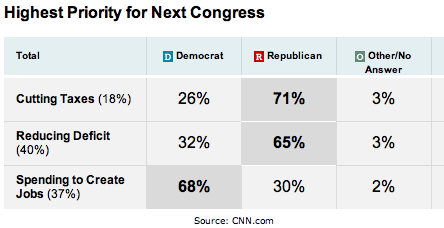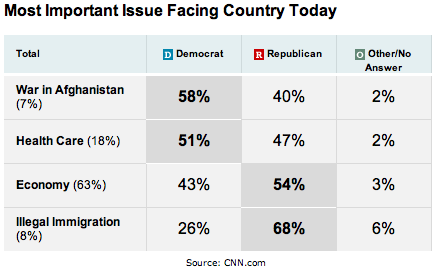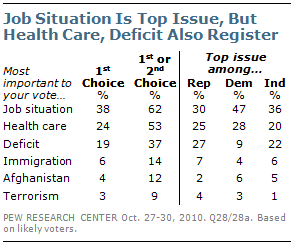
Just how important do Americans consider the federal budget deficit? And how high a priority was reducing the deficit among voters in last week's midterm elections?
These are important questions, especially in light of the release yesterday of a deficit reduction plan by the chairmen of President Obama's deficit commission. Unfortunately, recent surveys have produced contradictory answers. While the voters who supported Republicans last week do like the idea of "reducing the budget deficit," deficit reduction appears to be a secondary issue among both last week's voters and the larger population.
If you followed results of the networks' joint national exit poll, you probably saw mention of this question: "Which should be the highest priority for the next Congress, reducing the budget deficit, spending to create jobs or cutting taxes?" The tabulations posted on CNN show, not surprisingly, that voters who rank tax cuts or deficit reduction as their first priority voted overwhelmingly for Republican candidates for the House, while those who give greater priority to spending to create jobs voted overwhelmingly for Democrats.**

The national exit poll also included another issue priority question that did not include any reference to budget deficits and that did not pair concern with "jobs" with an endorsement of further "spending." It asked: "Which ONE of these four issues is the most important facing the country?" The answers offered were the war in Afghanistan, health care, the economy and illegal immigration.

On this question, nearly two-thirds of voters (63%) chose the economy, and a 54%-to-43% majority of these voters favored Republicans.
Exit polls are severely limited by space and time, which helps explain the relatively small number of answer options offered (and why these two questions were offered on different forms, so a cross-tabulation of the two questions is impossible). In this case, for whatever reason, the exit poll did not ask voters to choose in a more straightforward way between the economy, reducing deficits and other issues as many many telephone polls have done in recent months.
As blogger Ben Somberg points out (via Gelman), those questions have produced a different sense of where reducing the deficit ranks as a priority for American adults. Here are the results (via the Polling Report):
USA Today/Gallup Poll (10/28-31, n=1,140 adults) - Looking ahead, which of the following should be the highest priority for Congress after the election: repealing the new healthcare law, passing a new economic stimulus bill designed to create jobs, cutting federal spending, or extending all the federal income tax cuts enacted during the Bush administration?
38% Passing new stimulus bill designed to create jobs
24% Cutting federal spending
23% Repealing the new health care law
8% Extending all federal income tax cuts enacted during the Bush administration
4% Other (vol.)
3% Unsure
CNN/Opinion Research Corporation (10/27-30, n=1,006 adults) - Which of the following is the most important issue facing the country today?:
52% The economy
8% The federal budget deficit
8% Education
8% Health care
8% The wars in Iraq and Afghanistan
8% Illegal immigration
4% Terrorism
4% Energy and environmental policies
1% Other (vol.)
Pew Research Center (10/27-30, n=2,373 registered voters) - Of the following six issues, which ONE would you say is MOST important to your vote for Congress this year: the job situation, health care, the deficit, immigration, the situation in Afghanistan, or terrorism?
39% The job situation
25% Health care
17% The deficit
6% Immigration
5% The situation in Afghanistan
3% Terrorism
2% Other (vol.)
4% None/unsure
All three of these questions prompt with lists of potential answers, and the responses vary depending on the number of choices in the list and the language used to describe each choice. As such, the priority given to deficits or spending varies between 8% and 24% -- still far below what the 40% result on the exit poll question.
But these were surveys of adults, not the arguably more conservative and Republican voters who cast ballots last week. And the questions only allowed voters to offer a first priority. Perhaps deficit reduction would rank higher if voters were offered a second choice.
A table in the Pew Research Center report on their October survey helps resolve both issues.

First, the percentage of likely voters that rank "the deficit" as the most important issue (19%) is only slightly bigger than among all registered voters (17%; and keep in mind that the final Pew Research likely voter results provided a near perfect estimate of the national House vote). Second, when they tabulate both the first and second choices, the number that choose "deficit" grows (to 37%, not far from the 40% offered on the exit poll question), but then so does concern about other issues. The "job situation" (62%) and "health care" (53%) still rank higher.
Back to the exit poll questions. It is fair to say that those who voted for Republican candidates last week find the seemingly contradictory goals of "cutting taxes" and "reducing the deficit" to be far more appealing than the notion of further "spending to create jobs." It is not fair to say that deficit reduction is now the top priority of even the more conservative electorate that cast ballots last week, much less the broader adult population.
*If you follow exit polls *very closely, you also know that the exit pollsters re-weighted the tabulations of their national sample in recent days to better conform to the national popular vote in U.S. House races, resulting in very small differences in some results. The CNN tabulations appear to reflect the newer, updated weighting.
Follow Mark Blumenthal and HuffPost Pollster on Twitter
